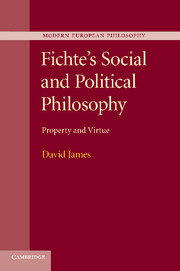Book contents
- Frontmatter
- Contents
- Acknowledgements
- List of abbreviations of Fichte's works
- Introduction
- 1 Fichte's theory of property
- 2 Applying the concept of right: Fichte and Babeuf
- 3 Fichte's reappraisal of Kant's theory of cosmopolitan right
- 4 The relation of right to morality in Fichte's Jena theory of the state and society
- 5 The role of virtue in the Addresses to the German Nation
- Bibliography
- Index
Introduction
Published online by Cambridge University Press: 03 May 2011
- Frontmatter
- Contents
- Acknowledgements
- List of abbreviations of Fichte's works
- Introduction
- 1 Fichte's theory of property
- 2 Applying the concept of right: Fichte and Babeuf
- 3 Fichte's reappraisal of Kant's theory of cosmopolitan right
- 4 The relation of right to morality in Fichte's Jena theory of the state and society
- 5 The role of virtue in the Addresses to the German Nation
- Bibliography
- Index
Summary
J. G. Fichte played an essential role in the development of the philosophical movement known as German idealism, appropriating the critical philosophy of Kant in a way that came to influence later thinkers such as Schelling and Hegel. Although there has been a renewed interest in Fichte's philosophy in the English-speaking world, the last book in English by a single author on Fichte's political thought dates back to the 1930s. While I hope to remedy this situation, my discussion of Fichte's social and political philosophy will be limited in two important respects. First of all, this book deals mainly with Fichte's writings in this area belonging to the period from his professorship at the University of Jena to the time of the publication of the Addresses to the German Nation (Reden an die deutsche Nation), a period that extends roughly from 1794 to 1808. Secondly, I limit myself to dealing with two particular themes which I consider to be so integral to Fichte's social and political philosophy that they provide the key to understanding its most basic aims and character. These are the themes of property and virtue, which themselves relate to another concept that is central to Fichte's social and political philosophy and, indeed, to his philosophy as a whole, namely, freedom.
To begin to explain why I have chosen to focus on these themes, it will help if I first say something about another theme that has recently provoked interest in Fichte's philosophy, namely, the concept of recognition, though this interest has generally been accompanied by the claim that it is Hegel, rather than Fichte himself, who develops the concept of recognition as a central category in social and political philosophy.
- Type
- Chapter
- Information
- Fichte's Social and Political PhilosophyProperty and Virtue, pp. 1 - 20Publisher: Cambridge University PressPrint publication year: 2011



